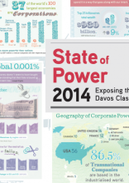 Today the Dutch senate met to discuss the state of the constitutional state in an expert consultation. One of the speakers, Mr. Alex Brenninkmeijer, stated that a strong constitutional state is a hazard to a weak democracy. The former should be a product of the latter and not the other way around. He pointed to the negative impact of populism in the Netherlands, which causes all other parties grouping together united against the populist views. As a result the real countervailing power mechanism of opposition is undermined and replaced by populism. The case of legitimacy Also the State of Power report, recently published by the Transnational Insitute in the run-up to Davos, argues that "legitimacy (of the state) depends on democracy—otherwise all forms of power, where government is concerned, are merely variations on the theme of oppression whether called tyranny, dictatorship, or autocracy". The report continues to report on the state of power and reflects on the rise of a new set of values supporting "a new ideology of selfishness and cruelty". The changes that reflect these new values are taking place mainly in government which, in recent years, has been dominated by the neoliberal model. "It has been steadily gaining ground despite overwhelming proof that it is harmful to nearly everyone, except for the extremely wealthy and for the top people in the corporate sector" the report states. "The former goal of building a strong, healthy and lasting business enterprise well integrated into the community has been replaced by the single imperative of "shareholder value" Populism replaces healthy countervailing power In recente years, the Netherlands have witnessed a toxic mix of a neoliberal government having ruled the Netherlands with the Christian Democrats for a while with a populist party condoing it, and in the last few years the social democrats were drawn into a cabinet that pursues a progressive but intrinsically neoliberal agenda. The combination of small conservative (ChristenUnie & SGP) and progressive (D66) parties now supporting this cabinet pragmatically to keep this government in the driving seat only goes to show how divergence of views (normally expressed in public) is increasingly absent of the public debate. This illustrates the fear of countervailing power or difference of opinion. Even within parties differing views are not embraced but extinguished in order to win elections with a 'clear profile' that is ideally 'sold' to the electorate in a party program, with Utopia still on the horizon and realism left behind. Access to the courts The expert meeting naturally was much concerned about the poor access to the courts, currently guaranteed with subsidies, already suffer a 20% reduction in the nummer of court cases as a result of higher entrance fees. The austerity measures of the government implies a further reduction of 25%, for a large majority affecting the possibiltiy to file a case against the state. The solution could possibly be found outside the court room. If only authorities would take more time to meet the general public for dialogue and informed decision-making, similar cost reduction could be obtained according to Brenninkmeijer. Instrumentalising judicial power for governance purposes will weaken the constitutional democracy. Listening to the discussion (in Dutch) and reading the TNI report together may provide a clear picture of the State of Power in the Netherlands. A new series of U®conversations is being organized by URAIDE in Wageningen, featuring Fiona Dove, Executive Director of the Transnational Institute on February 28, 2014. Comments are closed.
|
About meMy name is Reinier van Hoffen. U®Reading
Click here for a summary.
Also find the text of a lecture Dr. Achterhuis held at the 2012 Bilderberg conference. Archives
August 2022
|
AddressNachtegaallaan 26
Ede, the Netherlands |
Telephone+31 (0)6 1429 1569
|
|
 RSS Feed
RSS Feed
















